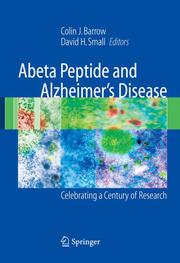Detailansicht
Abeta Peptide and Alzheimer's Disease
Celebrating a Cetury of Research
ISBN/EAN: 9781852339616
Umbreit-Nr.: 1051542
Sprache:
Englisch
Umfang: xi, 298 S.
Format in cm: 7.1 x 26.1 x 18.2
Einband:
gebundenes Buch
Erschienen am 18.12.2006
Auflage: 1/2007
- Zusatztext
- InhaltsangabeA Brief Introduction to the History of the ß-Amyloid Protein (Aß) of Alzheimer's Disease.- The Aßcentric Pathway of Alzheimer's Disease.- The Function of the Amyloid Precursor Protein Family.- The involvement of Aß in the neuroinflammatory response.- Amyloid ß-Peptide(1-42), Oxidative Stress, and Alzheimer's Disease.- Amyloid Toxicity, Synaptic Dysfunction and the Biochemistry of Neurodegeneration in Alzheimer's Disease.- Aß Variants and Their Impact on Amyloid Formation and Alzheimer's Disease Progression.- Copper Coordination by ß-Amyloid and the Neuropathology of Alzheimer's Disease.- Cholesterol and Alzheimer's Disease.- Amyloid ß peptide and central cholinergic neurons: involvement in normal brain function and Alzheimer's disease pathology.- Physiological and Neurotoxic Properties of Aß Peptides.- Impact of ß-Amyloid on the Tau Pathology in Tau Transgenic Mouse and Tissue Culture Models.- Glial Cells and Aß Peptides in Alzheimer's Disease Pathogenesis.- The Role of Presenilins in Abeta-Induced Cell Death in Alzheimer's Disease.- Immunotherapeutic approaches to Alzheimer's disease.- Mouse Models of Alzheimer's Disease.
- Kurztext
- Abeta Peptide and Alzheimer's Disease summarizes current knowledge of beta-amyloid peptide (Aß) and its role as the major culprit in Alzheimer's Disease (AD), shown by recent advances in genetics and brain biochemistry. Written by leaders in the industrial and academic world specializing in this rapidly moving area, the book covers fundamental biochemical studies on the Aß peptide, the genetic impact on Aß expression and processing, and various AD therapeutic strategies that target Aß. Although specifically focusing on Aß and AD, there is also some discussion on the similarity and differences of this peptide and AD with other amyloidogenic diseases, such as prion disease, Parkinson's and Huntington's. This book will primarily be of interest to AD researchers and clinicians but also to researchers of other amyloid diseases.
